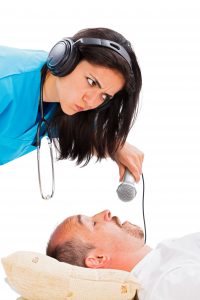 If you’re one of the millions of people in the US who may be suffering from sleep apnea, it’s time for a sleep study. Many patients dread this process, especially when it comes to sleeping away from home. If you’ve been putting off a sleep study, you’re getting ready for your study, or you’re just curious about how it works, keep reading. If you’re ready to find out more, contact the Lutz dental team at Nelson Dentistry and Dental Sleep Medicine. We welcome patients from all surrounding communities including Wesley Chapel, and we’ll be happy to walk you through the sleep study process from start to finish. If you’re not sure you need a sleep study, we also provide a consultation to help you determine whether or not you are at high risk for sleep apnea.
If you’re one of the millions of people in the US who may be suffering from sleep apnea, it’s time for a sleep study. Many patients dread this process, especially when it comes to sleeping away from home. If you’ve been putting off a sleep study, you’re getting ready for your study, or you’re just curious about how it works, keep reading. If you’re ready to find out more, contact the Lutz dental team at Nelson Dentistry and Dental Sleep Medicine. We welcome patients from all surrounding communities including Wesley Chapel, and we’ll be happy to walk you through the sleep study process from start to finish. If you’re not sure you need a sleep study, we also provide a consultation to help you determine whether or not you are at high risk for sleep apnea.
In-Office Sleep Study
Still the most common form of sleep study, the office study is conducted overnight in a facility with sleep specialists. A series of wires are attached to all areas of the body. These are connected to sensors that produce a read out that indicates any time the patient experiences an apnea incident, cessation of breathing for ten or more seconds. Many patients find these studies uncomfortable, and they can have difficulty staying asleep. These sleep study facilities do their utmost to ensure patients are comfortable and can sleep soundly, but there are many patients who receive more accurate results with an at-home study.
At-Home Sleep Study
Like traditional office studies, at-home studies require patients to wear a series of electrodes and wires to gather information during sleep. A sleep doctor will walk you through where and how to apply these electrodes to capture information. Patients will likely need to wear these information gathering tools for several consecutive nights. Then, they’ll return to the sleep doctors who will review the results of their home study.
Sleep Apnea Diagnosis & Treatment Planning
Following either an office or home sleep study, you’ll receive a report disclosing the number and length of apnea events during sleep. Based on this information, a sleep doctor can make recommendations for treatment. Traditionally, a continuous positive airway pressure (CPAP) system was recommended to treat sleep apnea. Studies have shown that a large majority of patients have difficulty adjusting to the sounds and sensations of using their CPAP systems. For this reason, many patients are referred to a dentist like Dr. Jay Nelson. He has advanced training and expertise that allows him to custom craft comfortable oral appliances for sleep apnea suffers. These appliances shift the jaw forward, place pressure on the throat, and keep the airway open throughout the night, allowing patients to breathe deeply.
